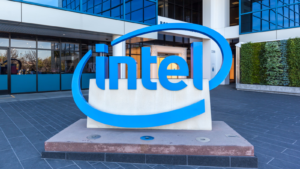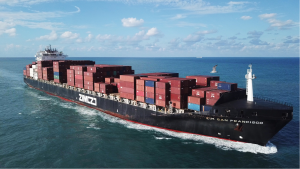Identifying the next big opportunity can be as elusive as stock market rewards. Identifying the hidden potential within the stock market often demands keen insight and strategic analysis. This article explores three stocks ready to skyrocket with unique catalysts that catapult their value to unprecedented heights.
Read more to unpack the layers of their operational strengths, geographic advantages and financial soundness, which provides a glimpse into these stocks’ lucrative prospects. Learn why these stocks ready to skyrocket are prime contenders for investment.
Intel (INTC)

First on our list of stocks ready to skyrocket is Intel (NASDAQ:INTC), the only leading-edge semiconductor manufacturer at scale in every major region. This represents the company’s edge through geographic diversification. Operating manufacturing facilities in diverse regions, such as the U.S., Ireland and Europe, provides Intel with a resilient supply chain. The establishment of high-volume EUV production in FAB 34 in Ireland is a significant milestone, both technologically and strategically.
In the same direction, high-volume EUV manufacturing being well underway in Oregon and Ireland signifies Intel’s capability to scale up advanced manufacturing processes globally. Oregon’s role as a hub for EUV manufacturing and FAB 34’s position as the first high-volume EUV production facility in Europe further solidify Intel’s focus on ensuring a diverse and robust manufacturing network.
Fundamentally, the emphasis on geographic diversity and resilient supply is particularly relevant in an industry where disruptions can impact the supply chain. By having a high-volume EUV presence in multiple regions, Intel is strategically positioned to mitigate risks associated with a concentrated manufacturing footprint.
Furthermore, Intel’s efforts to expand its foundry ecosystem contribute to its global manufacturing strength. The strategic partnerships with Synopsys (NASDAQ:SNPS), Tower Semiconductor (NASDAQ:TSEM) and the growing foundry business underscores Intel’s focus on serving its product roadmap and providing manufacturing services to external customers.
Finally, the collaboration with Synopsys to include IP for Intel 3 and Intel 18A for both Intel internal and external foundry customers expands Intel’s reach in the semiconductor ecosystem. Hence, this move enhances Intel’s role as a global foundry player, providing advanced manufacturing capabilities to a broader customer base.
Torm (TRMD)

Torm’s (NASDAQ:TRMD) proactive approach to fleet management is evident in its acquisition and divestment strategy. The company acquired ten vessels and divested four in the first nine months of 2023, suggesting agility in responding to market conditions.
Since the end of September 2023, Torm has acquired four fuel-efficient mid-range (MR) vessels built in 2015 and 2016 and 8 long-range-2 (LR2) vessels built from 2010 to 2012. Financed through cash and share issuance, these acquisitions contribute to a strategic fleet expansion, aligning with Torm’s belief in the supportive nature of expected changes to the refinery landscape, particularly favoring LR vessels.
Additionally, fleet optimization involves divesting older vessels, as seen in selling and delivering 1 MR vessel in Q3. Torm has divested two older MR vessels and one older LR2 vessel after the end of Q3 2023, resulting in a fully delivered fleet of 93 vessels. Thus, this approach aligns with Torm’s focus on maintaining a modern, high-quality fleet to enhance operational efficiency and meet market demands.
Fundamentally, another crucial factor contributing to Torm’s strength lies in its operational strategy, articulated through the “One TORM” platform. This platform aims to ensure the highest possible credibility of the fleet through integrated commercial and technical management. The emphasis on setting high-quality standards for vessels, regardless of age, reflects Torm’s focus on optimal performance. Hence, this approach ensures that customers choose Torm vessels based on quality and safety considerations, reducing the likelihood of vessel deselection.
Finally, the One TORM platform predicts optimal market positions and minimizes resource leakage through fleet-wide monitoring and information sharing. Therefore, Torm aims to optimize performance and improve returns on invested capital by promptly identifying and addressing operational inefficiencies.
Frontline (FRO)

Frontline’s (NYSE:FRO) performance reflects commendable earnings across its fleets. Specifically, the company achieved impressive daily rates across its Very Large Crude Carriers (VLCC), Suezmax and LR2/Aframax fleets. This data is a testament to the company’s ability to secure favorable rates in a competitive market.
The significance lies in the steady improvement observed from Q3 to subsequent quarters. The increasing rates, notably reaching $48,100 per day for VLCCs, $50,300 per day for Suezmax tankers and $51,300 per day for LR2/Aframax tankers, indicate a positive trajectory. This consistency in securing higher rates suggests the company’s adeptness in capitalizing on market demand and maximizing its revenue potential.
Fundamentally, operational efficiency, as reflected in operating expenses (OpEx), is a pivotal aspect of Frontline’s financial health. The breakdown of OpEx for different types of tankers — $7,400 per day for VLCCs, $7,500 for Suezmax and $7,100 for LR2, demonstrates the company’s efficient cost structure. Also, including drydock costs in OpEx is vital for top-line growth and maintaining and upgrading the fleet. As a result, there is an estimation that drydock costs reduce breakeven rates by $2,000 per day.
Regarding liquidity: cash and cash equivalents are at $715 million, suggesting stability and flexibility. Including the undrawn amount of the senior unsecured revolving credit facility adds another layer to the available resources.
Finally, the absence of meaningful debt maturities until 2027 suggests a prudent debt management strategy. The healthy leverage ratio of 52% suggests the company’s ability to balance debt levels relative to its equity. Therefore, these fundamentals are critical to support the continued market value momentum.
As of this writing, Yiannis Zourmpanos held a long position in INTC. The opinions expressed in this article are those of the writer, subject to the InvestorPlace.com Publishing Guidelines.
